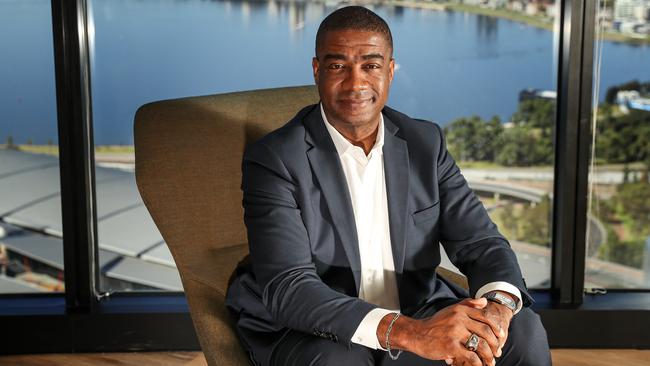Oil and gas helped Asia: Chevron
Australia’s efforts to keep its oil and gas industry operating through the COVID-19 pandemic helped protect the broader Asian region, Chevron Australia boss Al Williams says.

Australia’s efforts to keep its oil and gas industry operating through the COVID-19 pandemic helped protect not just Australia’s economy but that of the broader Asian region, outgoing Chevron Australia boss Al Williams says.
Mr Williams is preparing to return to his native US shortly, having been promoted to vice president of corporate affairs at the energy giant.
His two-year stint running the giant’s Australian assets was brief but full of drama, as operational headaches, a startling collapse in energy prices and a global pandemic all had a massive impact.
Speaking to The Australian in Chevron’s Perth headquarters, Mr Williams said the ability of Western Australia’s mining and oil and gas industries to continue producing throughout the crisis served to highlight their broader significance.
“What sometimes gets lost is that when you look at the resource sector in Australia, it has an economic impact locally but that is tenfold regionally,” he said.
“Don’t underestimate how significant an impact Australia played in allowing China’s economy to continue to rebound like it did, to be able to allow Japan and other regional economies to sustain themselves like they did. That was all because of what the government and the communities and industry was able to collaborate and do here, and that impact went well off our shores”.
He said the collaboration between governments, universities and industry during the pandemic had stood out, given their ability to find a way to both keep the broader community and at-risk remote Indigenous communities safe while also allowing the industry to continue operating when many other businesses were having to shut down.
The pandemic was far from the only challenge during Mr Williams’ tenure.
Both of Chevron’s flagship Australian LNG projects, Gorgon and Wheatstone, have had to navigate through some major unplanned maintenance issues in the past year while a carbon capture and sequestration project at Gorgon has endured a complex and protracted ramp-up.
The CCS issues have left Chevron at risk of coping penalties should it fall short of emissions commitments, but Mr Williams said the facility had reduced Gorgon’s emissions by more than 2.8 million tonnes in the past two years and he was still confident that the initiative was worth doing.
“When you’re trying to pioneer something, it requires a lot of innovation, a lot of ingenuity, and a lot of technological firsts. I would say we should embrace that,” he said.
The lessons from Gorgon CCS would have an impact on other similar projects around the world.
“What you’re seeing is continuous progression, and where we’re going to be three years from now, five years from now, it’s going to be even better than where we are today,” he said.
“Because we know that this is truly something that is groundbreaking, we‘re sharing all of our information, we’re sharing them with universities, we’re sharing them with other states, and Australia, and we’re sharing it with the industry, because it is about going on this expedition together and learning and knowing that we see carbon capture sequestration systems as part of the lower carbon energy equation of the future.”
The plunge in oil prices early in the pandemic, when Russia and Saudi Arabia clashed over oil supply, prompted global cuts to the Chevron workforce that went especially deep in Australia.
That process, he says, along with changes in the way people work has left the Australian arm of the business more competitive globally.
“What’s going to allow us to be competitive going forward is that the way we used to work even 12 months ago is not the way we’re working today, and it will not be the way we are working five years from now,” he said.
“Our way of working is evolving, and technology that may have taken 10 years (to develop) have been accelerated.”
Chevron has also flagged it was exploring sale of its one-sixth stake in the North West Shelf LNG project under Mr Williams after being approached by a number of parties.
The potential sale should not be seen as Chevron turning its attention away from Australia, he says, but rather as a reflection of the North West Shelf’s transformation into a tolling facility for third-party gas.
That sort of an asset, he says, is more naturally owned by groups looking for low-risk, steady financial returns.
“Once it becomes open access it’s not as critical that we physically own the infrastructure, as long as we get access to the infrastructure,” he said.
“That allows us to do the things we do best, and that‘s really go for the high risk investments of development and deployment knowing we’ve got access to the marketplace.”
While the job cuts and potential sale of the North West Shelf stake may suggest a company that is shrinking, rather than growing, its presence in Australia, Mr Williams is adamant that is not the case.
He points to Chevron’s re-entry into the Australian retail fuel market through its $425 million acquisition last year of Puma, the work already under way on Gorgon Stage 2, and the looming final investment decision on the Jansz-Io compression project, as a reminder of that commitment.
“Chevron is committed to Australia, we‘re long term investor we see Australia as a long term player, and there’s a lot of synergy between Australia’s interest and Chevron’s interest,” he said.


To join the conversation, please log in. Don't have an account? Register
Join the conversation, you are commenting as Logout